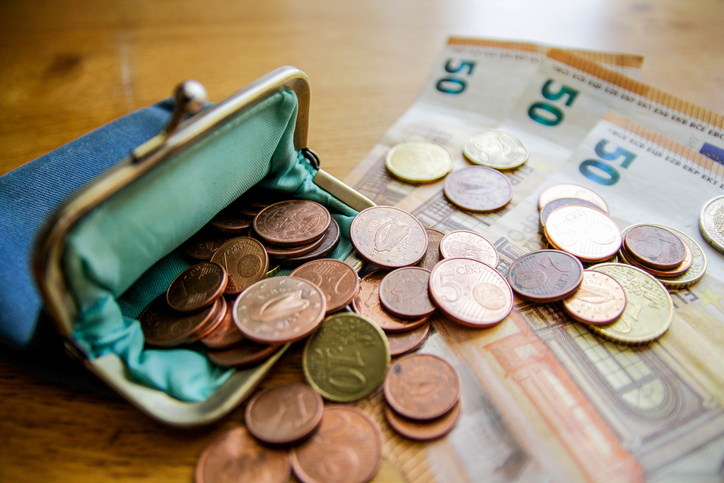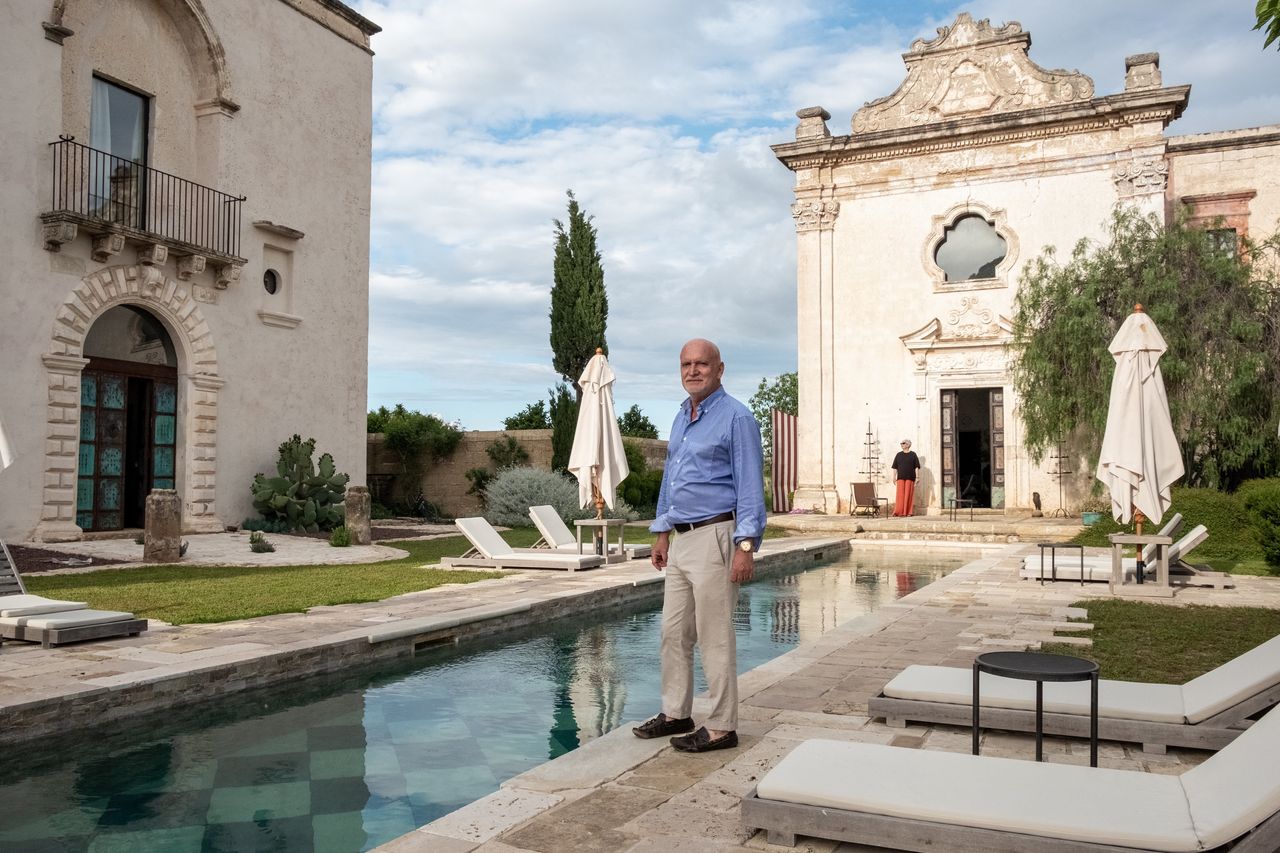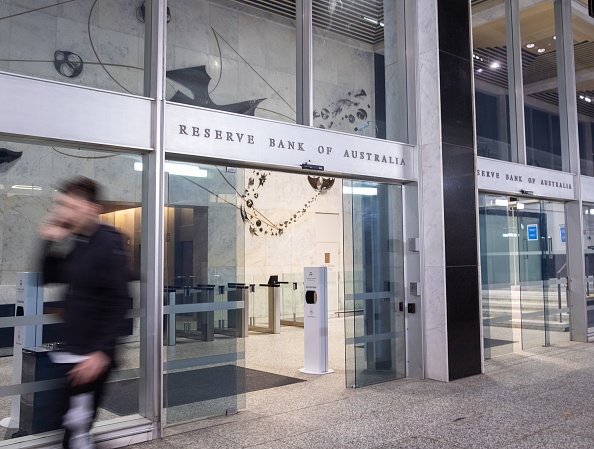Eurozone Slides Into Recession as Inflation Hurts Consumption
Weaknesses in Germany and Ireland more than offset growth in other economies at the start of the year
The eurozone has slipped into recession as Germany, its largest economy, wobbled, suggesting that the impact of Russia’s war in Ukraine may have been deeper than expected earlier this year.
While the U.S. economy has so far brushed aside higher borrowing rates and continues to grow thanks to robust consumption, employment and an extended market rally, Europe is lagging ever further behind, stuck in the economic equivalent of long Covid. While the U.S. economy is now 5.4% larger than it was before the Covid-19 pandemic struck, the eurozone economy is just 2.2% bigger.
Inflation driven by a spike in energy costs and stubbornly high food prices has softened in Europe recently but remains much higher than policy makers would like and is affecting consumption negatively.
The weakness in Germany is a particular concern. In past decades, the country’s economy often managed to recover rapidly from economic shocks thanks to the strength of its highly competitive exporters.
But global trade has suffered under the Covid-19 pandemic and mounting geopolitical tensions, and it may not offer the same degree of support this time. Factory output in the country showed a steep drop in March. And the continuing war in Ukraine, a close neighbour, is another major source of uncertainty for the region.
Because of its size, the German economy on its own can drag the eurozone up or down. The eurozone’s slide into recession at the start of the year came in spite of growth in France, Italy and Spain, its other large economies.
Economists think all this points to a slow and protracted recovery for the continent later this year, where consumers and businesses are also feeling the drag from higher borrowing costs as the European Central Bank continues to raise interest rates to fight inflation. The eurozone’s slide into recession wasn’t so dramatic as to trigger a pause in the ECB’s rate-raising campaign, according to most analysts.
The European Union’s statistics agency said Thursday the combined gross domestic product of the countries that share the euro fell at an annualised 0.4% during the three months through March, having also declined in the final three months of last year.
Eurostat had previously estimated that the currency area’s economy grew slightly in the first quarter, but the sizeable change to the data from Germany and weakness in Ireland and Finland pushed it into contraction. This left the region with two consecutive quarters of shrinking output, matching the official definition of an economic recession.
Economists expect growth to resume in the three months through June as falling energy bills ease the pressure on household budgets, but any rebound is likely to be anaemic. The Organization for Economic Cooperation and Development on Wednesday said it expected the eurozone’s economy to grow 0.9% this year, roughly half as much as the U.S. economy.
The main difference between the eurozone and the U.S. is consumer spending. Americans are spending freely on the activities they skipped during pandemic lockdowns, such as travel, concerts and dining out. Unlike Europeans, they haven’t had to cut their spending on goods to be able to do so. In Europe, household spending fell in both the final quarter of last year, and the first quarter of 2023. Imports also fell sharply in both quarters, a sign that weakness in the eurozone is affecting businesses in other parts of the world.
One reason for the growing trans-Atlantic economic gap is the amount of savings Americans accumulated during the pandemic. Oxford Economics estimates that while excess savings in the U.S. stood at around 8.3% of annual economic output at the end of 2022, in the eurozone the equivalent was just over 5%. Americans have also been more willing to draw on those savings, with surveys showing Europeans are conscious of the uncertainties flowing from the war in Ukraine.
Back in Europe, while energy prices have normalised from their 2022 peaks, food prices have continued to rise at a rapid pace, weakening household spending on other goods and services. U.S. food prices have been rising half as quickly as their European equivalents so far this year.
The European Central Bank’s series of rate increases, which started in July last year, have now worked their way through the currency area’s financial system. The drag on growth from that source is likely to build during coming months, with the ECB signalling that it intends to raise its key interest rate for an eighth straight meeting next week.
“A peak in underlying inflation wouldn’t be sufficient to declare victory: We need to see convincing evidence that inflation returns to our 2% target in a sustained and timely manner,” ECB policy maker Isabel Schnabel said Wednesday. “We aren’t at that point yet.”
The OECD said it expects eurozone inflation to fall to 5.8% this year from 8.4% in 2022, but remain well above the ECB’s target at 3.2% in 2024.
One reason for the eurozone’s slide into recession is that Ireland—long the currency area’s fastest-growing economy—experienced a 44.7% decline in factory output during March, likely driven by U.S. pharmaceutical companies that operate in the country. That led to a 17.3% annualized fall in the country’s GDP during the first quarter.
Ireland’s statistics office hasn’t offered a reason for that drop in production, but figures it released Wednesday showed a rebound of 70.7% in April, suggesting the first-quarter contraction is unlikely to be sustained.
The eurozone’s poor economic performance so far this year partly reflects the costs of Moscow’s invasion of Ukraine last year. The Russian economy contracted 2% last year and the OECD expects it to shrink a further 1.5% this year and 0.4% in 2024. Ukraine’s economy shrank by a third in 2022, and is likely to have suffered further damage following the destruction of a dam and hydroelectric plant in the country’s south this week.
In the U.S., unlike in Europe, a weakening of the jobs market is required before the National Bureau of Economic Research, an academic group, declares a recession. That has yet to happen in the eurozone, with employment increasing 0.6% during the first quarter.
 Copyright 2020, Dow Jones & Company, Inc. All Rights Reserved Worldwide. LEARN MORE
Copyright 2020, Dow Jones & Company, Inc. All Rights Reserved Worldwide. LEARN MORE
Chris Dixon, a partner who led the charge, says he has a ‘very long-term horizon’
Americans now think they need at least $1.25 million for retirement, a 20% increase from a year ago, according to a survey by Northwestern Mutual
Whether you call it charisma, charm or magnetism, some people seem like naturals. Good news: It can be learned.
Great leaders have it. Gen Z has a new word for it. Can the rest of us learn it?
Charisma—or rizz , as current teenage slang has anointed it—can feel like an ephemeral gift some are just born with. The chosen among us network and chitchat, exuding warmth as they effortlessly hold court. Then there’s everyone else, agonising over exclamation points in email drafts and internally replaying that joke they made in the meeting, wondering if it hit.
“Well, this is awkward,” Mike Rizzo, the head of a community for marketing operations professionals, says of rizz being crowned 2023 word of the year by the publisher of the Oxford English Dictionary. It’s so close to his last name, but so far from how he sees himself. He sometimes gets sweaty palms before hosting webinars.
Who could blame us for obsessing over charisma, or lack thereof? It can lubricate social interactions, win us friends, and score promotions . It’s also possible to cultivate, assures Charles Duhigg, the author of a book about people he dubs super communicators.
At its heart, charisma isn’t about some grand performance. It’s a state we elicit in other people, Duhigg says. It’s about fostering connection and making our conversation partners feel they’re the charming—or interesting or funny—ones.
The key is to ask deeper, though not prying, questions that invite meaningful and revealing responses, Duhigg says. And match the other person’s vibes. Maybe they want to talk about emotions, the joy they felt watching their kid graduate from high school last weekend. Or maybe they’re just after straight-up logistics and want you to quickly tell them exactly how the team is going to turn around that presentation by tomorrow.
You might be hired into a company for your skill set, Duhigg says, but your ability to communicate and earn people’s trust propels you up the ladder: “That is leadership.”
Approachable and relatable
In reporting this column, I was surprised to hear many executives and professionals I find breezily confident and pleasantly chatty confess it wasn’t something that came naturally. They had to work on it.
Dave MacLennan , who served as chief executive of agricultural giant Cargill for nearly a decade, started by leaning into a nickname: DMac, first bestowed upon him in a C-suite meeting where half the executives were named Dave.
He liked the informality of it. The further he ascended up the corporate hierarchy, the more he strove to be approachable and relatable.
Employees “need a reason to follow you,” he says. “One of the reasons they’re going to follow you is that they feel they know you.”
He makes a point to remember the details and dates of people’s lives, such as colleagues’ birthdays. After making his acquaintance, in a meeting years ago at The Wall Street Journal’s offices, I was shocked to receive an email from his address months later. Subject line: You , a heading so compelling I still recall it. He went on to say he remembered I was due with my first child any day now and just wanted to say good luck.
“So many people say, ‘Oh, I don’t have a good memory for that,’ ” he says. Prioritise remembering, making notes on your phone if you need, he says.
Now a board member and an executive coach, MacLennan sent hundreds of handwritten notes during his tenure. He’d reach out to midlevel managers who’d just gotten a promotion, or engineers who showed him around meat-processing plants. He’d pen words of thanks or congratulations. And he’d address the envelopes himself.
“Your handwriting is a very personal thing about you,” he says. “Think about it. Twenty seconds. It makes such an impact.”
Everyone’s important
Doling out your charm selectively will backfire, says Carla Harris , a Morgan Stanley executive. She chats up the woman cleaning the office, the receptionist at her doctor’s, the guy waiting alongside her for the elevator.
“Don’t be confused,” she tells young bankers. Executive assistants are often the most powerful people in the building, and you never know how someone can help—or hurt—you down the line.
Harris once spent a year mentoring a junior worker in another department, not expecting anything in return. One day, Harris randomly mentioned she faced an uphill battle in meeting with a new client. Oh!, the 24-year-old said. Turns out, the client was her friend. She made the call right there, setting up Harris for a work win.
In the office, stop staring at your phone, Harris advises, and notice the people around you. Ask for their names. Push yourself to start a conversation with three random people every day.
Charisma for introverts
You can’t will yourself to be a bubbly extrovert, but you can find your own brand of charisma, says Vanessa Van Edwards, a communications trainer and author of a book about charismatic communication.
For introverted clients, she recommends using nonverbal cues. A slow triple nod shows people you’re listening. Placing your hands in the steeple position, together and facing up, denotes that you’re calm and present.
Try coming up with one question you’re known for. Not a canned, hokey ice-breaker, but something casual and simple that reflects your actual interests. One of her clients, a bookish executive struggling with uncomfortable, halting starts to his meetings, began kicking things off by asking “Reading anything good?”
Embracing your stumbles
Charisma starts with confidence. It’s not that captivating people don’t occasionally mispronounce a word or spill their coffee, says Henna Pryor, who wrote a book about embracing awkwardness at work. They just have a faster comeback rate than the rest of us. They call out the stumble instead of trying to hide it, make a small joke, and move on.
Being perfectly polished all the time is not only exhausting, it’s impossible. We know this, which is why appearing flawless can come off as fake. We like people who seem human, Pryor says.
Our most admired colleagues are often the ones who are good at their jobs and can laugh at themselves too, who occasionally trip or flub just like us.
“It creates this little moment of warmth,” she says, “that we actually find almost like a relief.”
Chris Dixon, a partner who led the charge, says he has a ‘very long-term horizon’
Americans now think they need at least $1.25 million for retirement, a 20% increase from a year ago, according to a survey by Northwestern Mutual




















